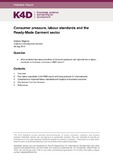| dc.contributor.author | Megersa, Kelbesa | |
| dc.date.accessioned | 2019-10-03T13:32:54Z | |
| dc.date.available | 2019-10-03T13:32:54Z | |
| dc.date.issued | 2019-08-06 | |
| dc.identifier.citation | Megersa, K. (2019). Consumer pressure, labour standards and the Ready-Made Garment sector. K4D Helpdesk Report. Brighton, UK: Institute of Development Studies. | en |
| dc.identifier.uri | https://opendocs.ids.ac.uk/opendocs/handle/20.500.12413/14733 | |
| dc.description.abstract | This rapid literature review summarises the existing evidence on labour standards and business outcomes within the global Ready-Made Garment Sector. This report provides a review of academic papers, policy briefs, and other reports on the topic. Ready-Made Garment (RMG) manufacturers are driven by the global pressure to continuously attain lower costs. Nevertheless, ‘sweatshop’ circumstances (i.e. poor labour standards) are not necessary conditions for the profitability of garment suppliers. Unfortunately, poor working conditions may continue as a result of a lack knowledge of best practices in human resources management, e.g. positive motivational techniques or multi-dimensional pay packages (BW, 2016; ILRF, 2019). The use of verbal and physical abuse to elicit more effort from workers has been shown to be detrimental to their productivity, contrary to the conventional wisdom of factory managers (BW, 2016). On the other hand, higher productivity and profitability are not guaranteed by better management practices of labour conditions. In cases where garment factories gain profit by coercing more effort from workers (e.g. via harsh treatment, low pay or excessive overtime, etc.), they may not have the commercial incentive to change their ‘sweatshop’ model. So far, the empirical evidence of a ‘win-win’ business outcome (i.e. enhancing labour standards for workers while boosting profit margins of garment suppliers) has largely been anecdotal (BW, 2016; p. 30). Some recent impact assessments on the nexus between better labour standards and business outcomes (e.g. gains in productivity, competitiveness and profitability) are establishing much-needed evidence on the subject (BW, 2016; Adhvaryu et al., 2016; Macchiavello et al., 2014; World Bank, 2012). | en |
| dc.language.iso | en | en |
| dc.publisher | IDS | en |
| dc.relation.ispartofseries | K4D Helpdesk Report;642 | |
| dc.rights.uri | https://www.nationalarchives.gov.uk/doc/open-government-licence/version/3/ | en |
| dc.subject | Industrial Development | en |
| dc.subject | Rights | en |
| dc.subject | Work and Labour | en |
| dc.title | Consumer Pressure, Labour Standards and the Ready-Made Garment sector | en |
| dc.type | Helpdesk | en |
| dc.rights.holder | © DFID - Crown copyright 2019 | en |
| dcterms.dateAccepted | 2019-08-06 | |
| rioxxterms.funder | Department for International Development, UK Government | en |
| rioxxterms.identifier.project | K4D | en |
| rioxxterms.version | VoR | en |
| rioxxterms.funder.project | 238a9fa4-fe4a-4380-996b-995f33607ba0 | en |

